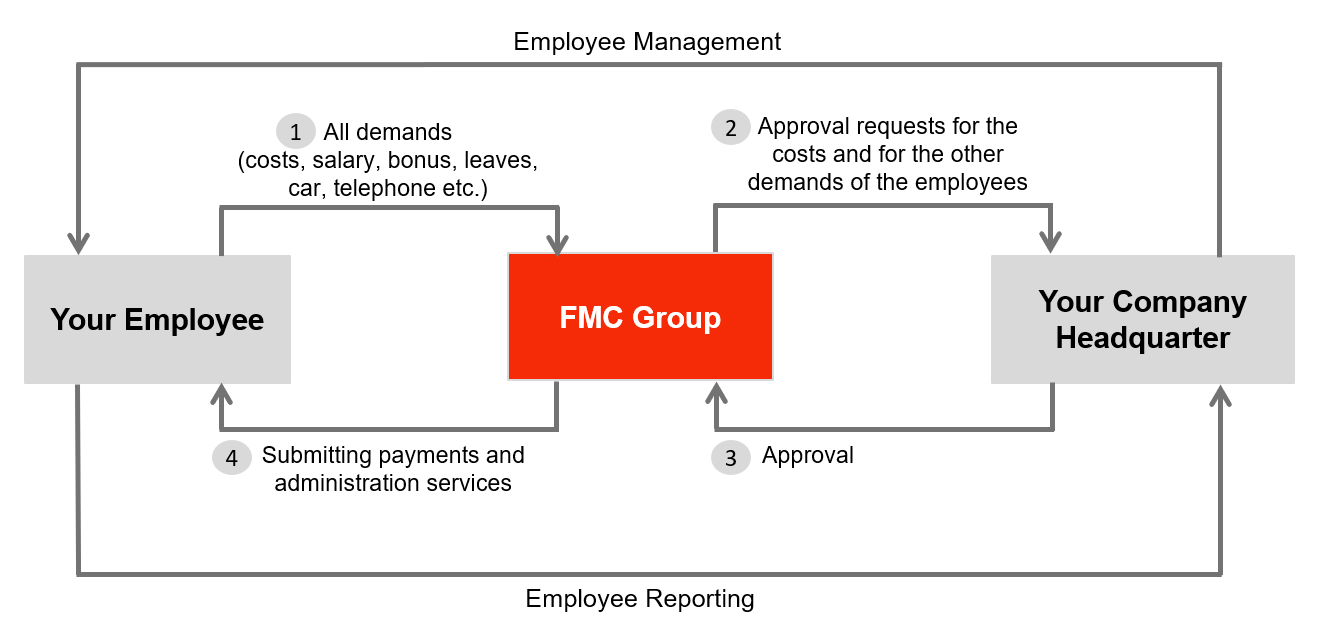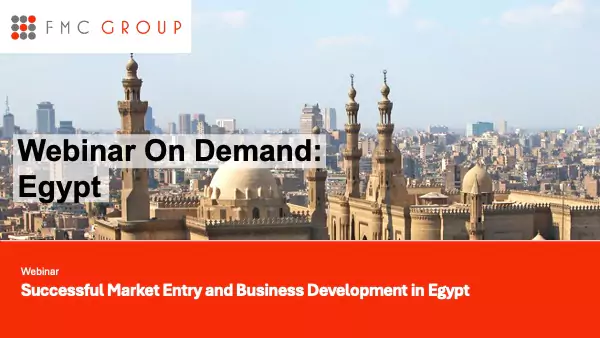
Employer of Record Egypt (EOR Egypt)
Our Employer of Record Egypt service enables clients to hire employees in Egypt without the need to operate a local legal entity there.
With over 100 million inhabitants, Egypt is the third-biggest country in Africa and the 14th-largest country in the world by population. An excellent strategy to enter the Egyptian market is to use our Employer of Record service. Our clients typically use EOR Egypt for sales and business development positions as well as for distributor management.
By this, you will be able to concentrate entirely on your business while we handle all local needs as well as the lengthy and complex administrative issues (Egypt now ranks 114th in the World Bank’s “Ease of Doing Business Index”).
Our free webinar on demand “Tunisia and Morocco as a Hub for Developing Your Business in Francophone North-Africa” has a lot of additional information. You can also subscribe to our monthly Business News North Africa newsletters.
Content:
Employer of Record Egypt - FMC Group's Approach
- Our local recruiting team can search for profiles according to your specifications and needs. It is also possible to hire candidates already identified by our clients.
- Negotiating and signing an employment contract in Egypt according to local employment law between the selected candidate and FMC Group Egypt.
- Running payroll accounting professionally in accordance with international standards and paying social security and taxes in compliance with Egyptian labor law.
- Travel expenditures, additional expenses, and allowances are managed and paid after the client’s authorization.
- Keeping track of leave entitlements alongside the client’s approval
- Private health insurance negotiation and execution (optional)
- The employee is integrated into the organization through defined processes and guidelines, as well as frequent feedback meetings.
- Constant interaction with our clients, particularly regarding personnel management in Egypt
- If required,we can also support you in defining the right Internationalization Strategy
EOR Egypt Management & Reporting Flow

Benefits of using an Employer of Record EOR provider
- Easy, flexible, and quick market entry into Egypt
- Complete visibility and control over market expansion with your own staff following your own strategy
- An optimal standpoint for establishing and maintaining a network of distributors and big clients
- Our customers and their teams are completely focused on the core business, while FMC Group handles the lengthy and difficult local administrative requirements
- If required, exit from the market is possible with this model
Advantages of the Egyptian market
Egypt is one of the most appealing investment locations in the world due to its fast economic growth, a wide range of reforms, and resistance to crises and economic cycles. Despite the global impact of the coronavirus epidemic, Egypt was one of the few countries to enjoy economic growth in 2020, with its real GDP increasing by 3.6 percent.
From the perspective of an investor, Egypt offers numerous market prospects and untapped growth potential, as illustrated by the following:
- A vast and young population of more than 100 million people, with an average age of 25. By 2050, Egypt’s population is predicted to reach 160 million.
- Multilateral trade accords provide access to 2.6 billion people in 47 European countries and 19 Eastern and Southern African countries.
- Strong infrastructure to promote economic growth: Egypt is now ranked 28th in the world for road quality, up from 115th five years ago.
- Energy sources that are relatively inexpensive and diverse. Egypt is also a regional hub for gas processing and shipment to Europe.
- Over the last five years, 885 new laws have been approved and 294 treaties have been signed to increase the efficiency of government services and attract international investment.
- The Egyptian General Authority for Investment and Free Zones gives further insight of Egypt’s economic environment
- You can also read more about Egypt’s economic prospects by visiting Invest in Egypt.
Hiring an Employee
Employment Contract – indefinite vs. fixed term
Employment contracts can be signed for an indefinite duration, for a fixed time period, or for the completion of a particular project or task. It is mandatory to have a written contract in Arabic.
Three copies of the contract need to be signed: one for company records, one for the employee, and one for the social security department.
Probation Period
It is common to agree on a probation period. The probation period needs to be defined in the employment contract and cannot exceed 3 months.
Work Week, Overtime & Maximum Working Hours
The usual working week in Egypt is 40 hours, from Sunday to Thursday. Friday and Saturday as rest days.
In Egypt, employees usually work for 8 hours a day, totaling 48 hours over a six-day week. Yet, those in the private sector often have a five-day workweek (Sunday to Thursday). In specific situations, an employee’s daily work hours can extend to 9 hours. After working up to 5 hours, employees are allowed a 1-hour break for lunch.
Employees can work overtime, but only up to legally defined limits. The law prescribes different overtime rates based on the time and day the extra hours are worked. On regular days, employees working overtime are entitled to an additional 35% of their hourly wage for each extra hour. If they work overtime during nighttime hours, the pay rises to an added 70%. Those working on public holidays should receive double their usual wage.
Typical Benefits
While there’s a national health insurance system in Egypt, many employers also provide private health insurance to their employees.
Time off Policies
Public Holidays
Employees are entitled to 14 full paid public holidays:
- Islamic New Year
- Birthday of Prophet Mohammed
- Eid al Fitr (2 days)
- Eid al Adha (3 days)
- Eastern Christmas
- Revolution Day
- Sham El Nessim
- Sinai Liberation Day
- Labor Day
- Revolution Day
- Armed Forces Day
Employees working on a public holiday are entitled to double their normal wages.
Annual Leave
After six months of service, Employees in Egypt can generally take 21 days of paid vacation per year. After 10 years with the same employer, or after reaching the age of 50, employees are entitled to 30 days of leave.
Other Leave Types
- Maternity leave: In Egypt, women who have been continuously employed with their current employer for at least 10 months are eligible for 90 days of paid maternity leave. While they can choose to begin this leave before their expected delivery date, it’s mandatory for them to not work during the initial 45 days following childbirth.
- Paternity Leave: As for men, there are no provisions for paternity leave in the current legislation.
- Emergency leave: This leave caters to unforeseen situations, and employees can take up to 6 days of emergency leave annually, but only 2 days consecutively. Even though emergency leave is a separate provision in the Labor Code, these days are deducted from the employee’s overall annual leave.
- Pilgrimage Leave: Employees who have served for a minimum of 5 years are given a paid leave for pilgrimage which can last up to a month. This may only be taken once during the employment. This is intended for those who wish to undertake religious pilgrimages.
Sick Leave
The maximum duration for sick leave is 180 days annually, during which the employee is safeguarded from termination and is compensated through the social security authority.
For the initial three months of sick leave, the employee receives 75% of their social security salary (the wage used to determine social security contributions). After this period, the compensation rate increased to 85%. To avail these sickness benefits, the employee is obligated to bring a medical certificate as proof.
Terminating an Employee
The notice period in Egypt is:
- 60 days for Employees with a service duration of less than 10 years
- 90 days for Employees with a service duration of more than 10 years
The process of terminating an employee differs based on the employment contract.
Fixed-term contracts: Employers aiming to terminate before the contract’s end date must compensate the employee with an amount equivalent to the remaining salaries due up to the contract’s end date.
Indefinite contract: An employer can terminate an employment contract if the employee has committed a significant breach, as outlined in Article 69 of the Labor Law. Examples of such breaches include:
- Repeatedly violating safety protocols.
- Misrepresenting identity or providing fraudulent documents.
- Unexplained absence for over 20 consecutive days or more than 10 days in a single year.
- Disclosing trade secrets leading to a measurable loss for the employer.
- Working with competitors in the same industry.
- Being intoxicated during work hours.
- Physically assaulting the employer, general manager, or any superior.
- Demonstrated job incompetence
When an indefinite-term employment contract is ended by the employer without a significant breach, the employee is due compensation. This compensation should comprise at least two months of their full salary for every year they’ve served, along with any other earned benefits such as accrued vacation, bonuses, and other perks.
In Egypt, any termination needs to be reported to the Ministry of Manpower and Migration. This authority then has a 15-day to make a judgment. Employees retain the right to challenge this decision if they disagree.
Disclaimer: Although we carefully researched and compiled the above information, we do not give any guarantee with respect to the actuality, correctness, and completeness.



